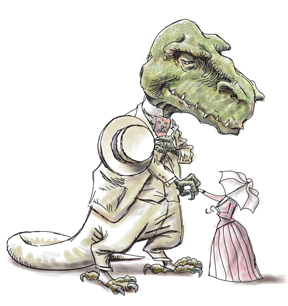|
Tyrus—A Fable on Creation |
 |
 |
You've probably heard there’s been great debate
of how things came to be and of our fate.
I offer this fable to stir up the pot.
It’s of a queen from a land that is not.
It’s of a time that never has been.
But in it there’s Truth, so let’s begin.
Although it’s in rhyme, it’s not easy fare.
Some thinking’s required so reader beware!Past the Straits of Bernoosti, through a midwinter squall,
‘round the Horn of Good Plenty, far away from it all,
sailed a dauntless zoologist on a mission most regal.
He was known near and wide as Lord Lewis de Beagle.To the Isle of Knish, he was sent by the Queen
to find a sensation for the Royal Museum.
T’would open its doors on the twelfth of July
and needed a corker to be a surprise
to all of Her subjects from throughout the nation
who’d visit the day of its great celebration.Undaunted and curious as no one could be,
a servant of science, Lord Lewis de B
fought typhoons and whirlpools, and fenced with swordfish
to reach the dark shores of the Isle of Knish.
Rare birds and strange mammals were known there to roam.
With a team of great hunters, he’d bring some back home
to tickle the fancy and throw in a tizzy
Her Personage Most Royal, Queen Victoralizzie.But ideas and research were Lewis’s meat;
he trained as a scribe at great scientist’s feet.
They taught him to look, and to dig, and to probe,
to scan every cell and describe each microbe.
Then make proposals of why things are so,
predicting beforehand how they may go.
“When you have pondered each fact from your query,
then you may postulate logical theory.
But theories are guesses, not fact, my dear Lew,
‘til tested and tested, and proved to be true.
For man’s eyes are short and can’t always see
around every corner and up every tree.
Truth’s always truth, Lew, no matter the theorem.
Its voices will speak. Do have clear ears to hear them.
Science, so-called, is a marvelous way
to give glory to God for all He has made.
But be careful, my son; be not puffed up with pride
nor vain in your thoughts and His Word deny.”But Lew viewed the world with his brilliant mind,
leaving the “old paths” way far behind,
saying, “How can the writings of shepherds be true
whose knowledge of Science was without a clue?
I’ve seen that a man quite resembles an ape
and thought that through time had evolved to this shape.
And all things did march from primordial ooze;
the strong o’er the weak, they did naturally choose.
And mutations did spawn, in increased elevation,
beasts that were better through each generation.”His teachings did earn him worldwide acclaim.
From schoolboys to scholars, all knew his name.
Though objections were raised nothing could stop it.
The world’s ears were tuned to their brave new prophet.“A slayer of fairy tales! Our minds can be free
from dusty old myths and stifling decrees
that bound us from pleasures we rightly deserve.
Now we can live our own passions to serve!”
An odd few spoke out to hold fast The Page
that’s proven its truth throughout every age.
“A great show of wisdom your teaching does boast
but ‘tis foolish to Him who matters the most.
For man’s eyes are short and can’t always see
around every corner and up every tree.”This irked him, these relics who held to such lies,
“Will they not see what is plain to their eyes?
These poor little children need stories to hold
that make them feel safe when faced with the cold
dark fact of the matter when death comes to call,
it is the end, and the end, that is all.”His colleagues did urge him to rebuke all this fiction
by showing the truth at the Queen’s exhibition.
Along with his quest to bring back a coup,
Lew sought to prove that his theory was true.
If he could find beasts that were in-between
what they are now and what they had been,
then that would prove without any doubt
that man did once grunt from out of a snout;
and all of the legends and writings of yore
were quaint ol’ wives tales, and not a bit more......(Read the rest of "Tyrus: A Fable on Creation" upon request)